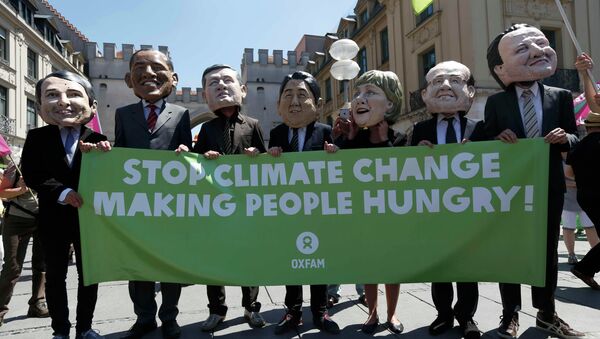As the leaders of the US, UK, Germany, France, Italy, Canada and Japan prepare to discuss a range of issues such as global food security and climate change in Bavaria's Elmau Castle, critics have slammed the G7 concept, accusing it of representing the height of hypocrisy.
Anti G7-Protests and increasing police checks before the summit starts. #StopG7 #stopg7elmau #G7 http://t.co/7SgUZSzWF1
— Björn Kietzmann (@bjokie) June 5, 2015
"The very concept that seven of the richest nations have a mandate to enact policies and programs that impact the rest of the world is in itself a gross and unjust anachronism," Nick Dearden, director of UK-based activist group Global Justice Now said.
While much of the criticism of this year's G7 event has centered on Russia's non-attendance at the Bavarian summit, Dearden says the leaders of the countries involved talks are not matching their words with their actions.
"One of the biggest global challenges that we face is a world of worsening inequality, but the geopolitical posturing of the G7 leaders seems to be more about scrabbling to maintain resources and influence for wealthy elites. It's no wonder that millions have to spent every year in fencing this institution off from protest when it suffers from such a crisis of legitimacy."
Global Food Security
One of the many issues to be discussed by G7 leaders is global food security and what the G7 can do reduce the levels of starvation and malnutrition in countries suffering a food shortage.
German Chancellor Angela Merkel backed the need for greater efforts to be made to global food security, saying she was "convinced that the G7 should now commit to eliminating hunger and absolute poverty by 2030. Only if we manage to secure the food supply for the world's growing population will there be a chance of success for other development measures."
"#G7 has no legitimacy in any decision-making on food and nutrition security and its polices lack a #humanrights approach" says @FIANista
— Ute Hausmann (@utehausmann) June 5, 2015
However, the measures put in place by G7 nations have been met with criticism among some campaigners, with accusations 'The New Alliance for Food Security and Nutrition' initiative was in fact hurting small farmers across Africa rather than alleviating hunger.
A recent audit into the initiative from the Independent Commission for Aid Impact (ICAI) found that the G7's New Alliance was "little more than a means of promotion for the companies involved and a chance to increase their influence in policy debates" with accusations it was merely helping large agribusiness companies assert their influence over poverty-stricken regions.
Climate Change
The issue of climate change and how to reduce our human imprint on the earth has been a key global topic of discussion, with the matter to be raised in Bavaria ahead of December's Paris climate change summit.
We can't afford a compromise on #climate at the #G7. Join the global call for 100% Clean Energy by 2050. Sign & RT! http://t.co/JLJ5QsKuY9
— Mark Ruffalo (@MarkRuffalo) June 4, 2015
Despite strong support for positive reforms in regards to reducing carbon emissions and moving towards a sustainable future among the world's major economies, critics have pointed out the contradiction between the message and actions of some G7 countries, with Germany's significant use of coal as a major source of energy production an issue that has attracted criticism from environmentalists.
Too much fossil and too little renewable energies: That’s how #G7 countries are generating their electricity! pic.twitter.com/HxyJ1LYnP5
— WWF EU (@WWFEU) June 5, 2015
Christine Haigh, an energy democracy campaigner at Global Justice Now said leaders need more than words to deal with the world's environmental threats.
"The G7 energy ministers typically make statements on the importance of dealing with climate change without there being any clear commitment to how it will happen. Historically the G7 nations have an appalling record in blocking progress at the climate negotiations. The mess that we find ourselves in now is in no small part due to the G7 nations refusing to acknowledge that climate change has primarily been caused by this handful of wealthy countries having emitted the vast majority of greenhouse gases between them."
@g7 a little less bla and a lot more action this time please! #g7 #G7Summit #G7Demo #G7Gipfel
— k.ludwig (@ohne_klu) June 5, 2015
Trade Deals and Global Inequality
A source of criticism and protest in recent times has been the nature in which a number of proposed international trade deals have been negotiated behind the scenes without public disclosure.
Among these are the Transatlantic Trade and Investment Partnership (TTIP) — currently being negotiated between the US and European Union — the Trans-Pacific Partnership (TTP) negotiated by 12 countries in the Asia-Pacific region and the Trade in Services Agreement (TISA).
While government and business figures have been talking up the benefits of such large scale trade deals, many others have raised concerns about the secretive nature of discussions amid fears the power given to multinational corporations under the proposals will question the sovereignty of many national governments when it comes to trade and services issues.
Just 1 of the things we're asking #G7 leaders to deliver this weekend. See the other 6 here: http://t.co/Kq0e3Kizhs pic.twitter.com/96WNrMTv5C
— ONE (@ONECampaign) June 5, 2015
With leaders remaining coy on releasing details of the negotiations, amid the release of recent WikiLeaks documents about the TISA agreement, trade campaigner Guy Taylor has slammed the G7, saying that supporting these trade agreements will lead to growing inequality between the rich and poor.
"TTIP may bring some economic benefits for a tiny handful of the business elite, but for the rest of us it would mean compromising vital public services, the stripping of regulations protecting labor rights and the environment, and a dramatic erosion of democratic process."
"Refugees Welcome…. #TTIP not" #G7Demo pic.twitter.com/Zgjm6SAFsg https://t.co/I9FjKnSwBY #G7-#Protest in #München #Munich #Migrants #Refugee
— Muschelschloss☕ ️ (@Muschelschloss) June 4, 2015
The G7 summit takes place in Bavaria, Germany, starting on the 7th June.






